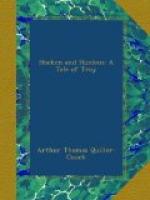“I wonder you have the face to tell this story,” put in Mr Philp.
The barber grinned. “Well, I thought as we’d both settled ’pon our fancy, in a neighbourly way. But be dashed if, soon after the followin’ Christmas, Mr Philp didn’t send his tie to the wash, and it came back any blue you pleased. ‘Make it one or t’other—I don’t care,’ said I: and he weighed the choice so long, bein’ a cautious man, that we missed to make up any bet at all. If you’ll believe me, that year they rowed a dead heat.”
“Very curious,” commented Cai.
“But that isn’ the end,” continued the barber. “Next year he’d washed his necktie again, and that ‘twas Cambridge he couldn’ dispute. So we put on another half-crown, and Oxford won by two lengths. . . . ’Twas a pity I could never induce him to bet again, for his tie went on getting Cambridger and Cambridger, while Oxford won four years out o’ five.”
“If you believe there was any honesty in it!” said Mr Philp. “‘Twas only my suspicious natur’ as saved me.”
The whole town, indeed, was watching the rivals, and with an open interest very difficult to resent. Nay, since it was impossible to tell every second man in the street to mind his own business, Cai and ’Bias accepted the publicity perforce and turned their resentment upon one another.
They continued, of course, to live apart, and Mrs Bowldler soon learned to avoid playing the intermediary, even to the extent of suggesting (say) some concerted action over the coal supplies. After the first fortnight no messages passed between them—
“They stood aloof, the
scars remaining,
Like cliffs that had
been rent asunder.”
If they met, in shop or roadway, they nodded, but exchanged no other greeting. They never met at Rilla Farm. How it was agreed I know not, though Mrs Bosenna must have contrived it somehow; but they now prosecuted their wooing openly on alternate days. Sunday she reserved for what Sunday ought to be—a day of rest.
“The artfulness!” exclaimed Mrs Bowldler on making discovery of this arrangement. “But the men are no match for us, my dear”—this to Fancy—“an’ the oftener they marry us the cleverer they leave us.”
“Then ‘tis a good job Henry the Eighth wasn’ a woman,” commented Fancy.
“There was some such case in the Scriptures, if you’ll remember; and it says that last of all the woman died also. If she did, you may be sure as ’twasn’t till she chose.”




